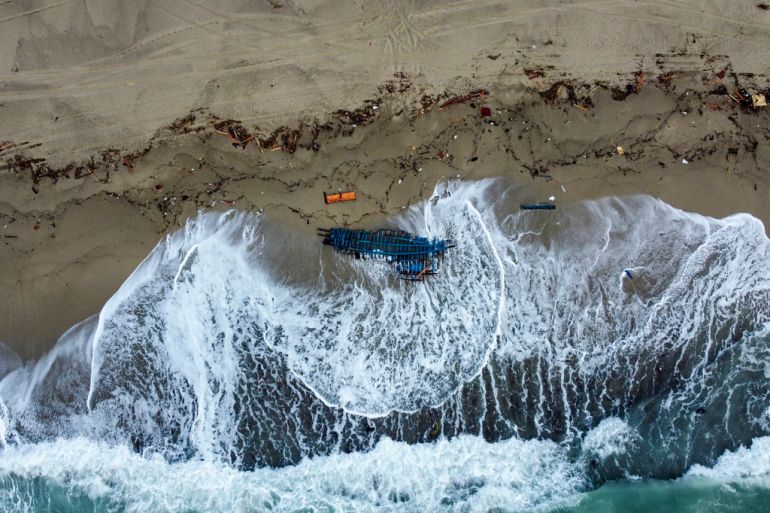UN report charts lethal cost of migration over past decade
More than 63,000 people died or disappeared on migration routes over the past decade, with more than a third fleeing conflict.

More than 63,000 people died or disappeared on migration routes around the world over the last decade, with drowning the biggest cause of death, according to the United Nations migration agency.
The International Organization for Migration (IOM) published the alarming death toll on Tuesday in a report on its Missing Migrants Project, which has been investigating the disappearances of people fleeing conflict, persecution and poverty since 2014.
Keep reading
list of 3 itemsWhy are refugee deaths at an all-time high?
Six dead after refugee boat capsizes in English Channel
Since tracking began, at least 63,285 people have died or are missing and presumed dead, according to the project, with over 8,500 losing their lives in 2023, the deadliest year yet. Nearly 60 percent of deaths documented were linked to drowning, with the number of victims surpassing 36,000.
Of those deaths at sea, more than 27,000 occurred in the Mediterranean, a route followed over the years by many migrants trying to reach southern Europe from northern Africa.
Most deaths in the Central Mediterranean were documented off the coast of Libya. But the IOM had recorded an “increase in departures and, correspondingly, shipwrecks” off the coast of Tunisia. At least 729 people died off the Tunisian coast in 2023, compared to 462 the previous year.
“The figures are quite alarming,” Jorge Galindo, a spokesperson at IOM’s Global Data Institute, told The Associated Press news agency. “We see that 10 years on, people continue to lose their lives in search of a better one.”
‘Invisible shipwrecks’
The IOM stressed the figures published in the report were incomplete, “likely only a fraction of the actual number of lives lost worldwide” because of the difficulty in obtaining and verifying information.
On the Atlantic route from Africa’s west coast to Spain’s Canary Islands, entire boats have reportedly vanished in what are known as “invisible shipwrecks”. Similarly, many deaths in the Sahara Desert are believed to go unreported.
Even when deaths are recorded, more than two-thirds of the victims remain unidentified. In more than half of all cases, the IOM was unable to even establish the sex or age of the migrant.
In cases that could be identified, just over one-third came from “countries in conflict or with large refugee populations”.
Despite the limits in the data, the IOM had recorded the deaths of “almost 5,500 females” on migration routes and “nearly 3,500” children.
The IOM said there was an “urgent need for strengthened search and rescue capacities”, as well as “safe, regular migration pathways” to prevent further deaths.
At sea, greater assistance was needed for migrants in distress “in line with international law and the principle of humanity”, the IOM said.
Currently on the Mediterranean Sea, “the large majority of search and rescue is done by nongovernmental organisations”, Galindo said.
Anti-immigration sentiment
When the IOM’s project began in 2014, European sentiment was more sympathetic to the plight of migrants, and the Italian government had launched “Mare Nostrum,” a major search-and-rescue mission that saved thousands of lives.
But, with anti-immigration political parties steadily gaining influence across Europe, governments have attempted to curb migration flows to their countries by pledging funds to countries across the Mediterranean such as Tunisia and Egypt.
Earlier this month, the European Union pledged a 7.4-billion euro ($8bn) funding package to Egypt that Italian Prime Minister Giorgia Meloni described as “the best way to address migratory flows”.
Tauhid Pasha, acting Chief of Mission for IOM Libya, told Al Jazeera that the narrative around immigration needs to change.
He said that countries that are gripped by anti-immigration sentiment need to acknowledge the positives around migration better.
Migration contributes to the development of the migrant’s origin and the countries as well as the countries they are heading to, he said.
“Many countries have shown that there are distinct labour shortages, demographic deficits, and migrants can help fulfil some of those shortages”, Pasha said.